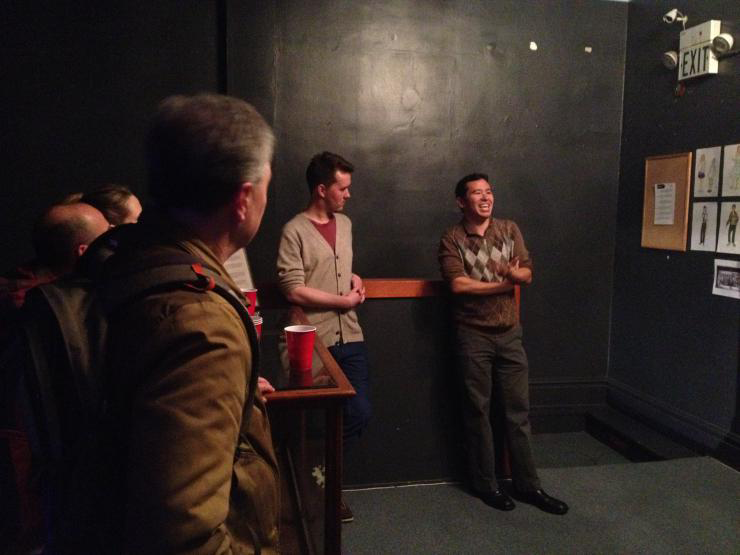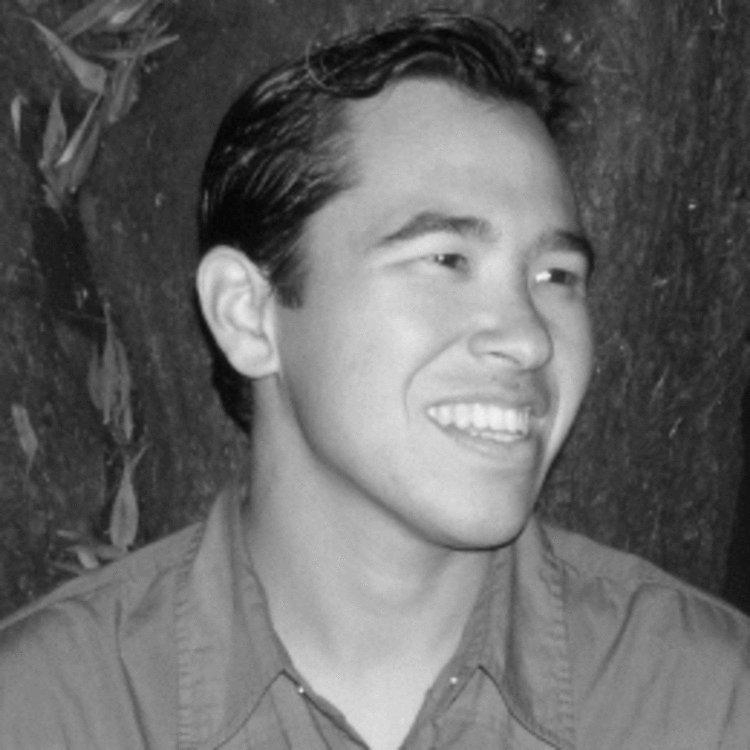The Revisions of Mount Misery
Scrabble, Jellyfish, and Immediate Rewrites
When writing a play, my revision process used to see several years transpire between drafts. It has now accelerated to Roadrunner speeds as I prepare Mount Misery for its May 2015 world premiere at The Cutting Ball Theater, where I am blessed to work as resident playwright, made possible by the vision and generosity of the Andrew W. Mellon Foundation. About eight hours ago, we held a staged reading of my latest draft of Mount Misery, finished the day before. My plans for socializing and sleep were deep-sixed by a burning desire to move forward with this play, to not wait weeks, months, or by God, years before working on the next draft, but rather beginning my rewrite that same day. The current draft now boasts cross-outs, brackets, wide-arcing arrows, and a full panoply of notes. Instead of spending my Saturday night out and about, I opt for a threesome…with Donald Rumsfeld and Frederick Douglass.
Mount Misery occurs on an eponymous Maryland property. The New York Times and The Economist reported its 2004 purchase by then-Secretary of Defense Donald Rumsfeld and his wife Joyce as a weekend getaway from DC. In 1834, Mount Misery was rented by Edward Covey, a poor farmer known regionally as a “negro breaker.” Slave owners rented to Covey particularly rebellious slaves who desired to flee North to freedom. Covey received free field hands in exchange for physically whipping them with the objective of breaking their disobedience. One of these slaves was sixteen-year-old Frederick Augustus Washington Bailey, who, after fleeing to freedom, became Frederick Douglass, whose words and legacy have a renewed relevance and urgency in our current national climate, where black men are killed before given a chance to utter a sentence, much less their names.
Perhaps against my better judgment, I actively pursue the bleeding of Rumsfeld’s wordplay and ideology into my brain. My saving grace may be the brilliantly eloquent writings of Douglass. Both men have entirely unique gifts for the spinning together of words.
This play occurred to me while reading The Economist on a stationary bike in 2009. The article, about oyster farming in the Chesapeake Bay, devoted all of two sentences to the Rumsfeld-Douglass connection. But two sentences was fuel aplenty to ignite my dramatist bellows. But, being in the midst of graduate school, working on several plays, Mount Misery soon entered my mental filing cabinet. There it remained for years until I shared the idea with Rob Melrose, Cutting Ball’s co-founder and artistic director. Rob shared his enthusiasm for the concept, and has now directed three staged readings of successive drafts, and will direct the full production this coming May.

This rapid progress is new to me. I love it. As Cutting Ball’s resident playwright, I devote myself fully to writing, and am diving deeper into Mount Misery than I have with any prior play. I own eight books about Rumsfeld, including one by him. I visited the Pentagon, and Douglass’s birthplace. I have watched Errol Morris’s documentary of the former Secretary of Defense, The Unknown Known, several times, and will watch it several more. Perhaps against my better judgment, I actively pursue the bleeding of Rumsfeld’s wordplay and ideology into my brain. My saving grace may be the brilliantly eloquent writings of Douglass. Both men have entirely unique gifts for the spinning together of words. I have seen both characters played by three different actors, which helps me imagine casting, and hear my dialogue in different voices.
During this extended process, Mount Misery has transformed in myriad and unexpected ways. I cut Dick Cheney and Condoleezza Rice. Two scenes with Covey’s wife are gone. In the first draft, the Rumsfeld’s, Douglass, and Covey play Scrabble. That draft is exiled to my external hard drive. One of my most recent excisions is jellyfish serving as a time-travel device: after Rumsfeld and Frederick are stung by said translucent, tentacled cnidarians, they are able to see and speak with each other across time. Since the scenic designer spoke in favor of that idea, I am now giving it renewed consideration, after chucking it into the rubbish bin. As the play currently stands, the characters simply see each other. I think the audience does require some sort of explanation, but as of now, I do not know what it will be. Both Rob and I have on our thinking caps to crack this nut.
One of the most useful comments was Rob challenging me to write each scene with the goal to be dramatically meaty enough that I could imagine it being assigned as a scene in an acting class. I have taken this comment deeply to heart, and am working to make all of my scenes fueled as much by the characters’ bodies and hearts as by their—and my own—brains. This new line of thought has prompted me to investigate acting classes. While I have little interest in performing onstage—although I know it would benefit me—I am certain that a series of acting classes will help me tremendously as a playwright. The actor is, at the end of the day, who the audience interacts with and therefore, arguably, the end-all of the theatre. “My” finished product is only ever a blueprint, and therefore never finished.
The lucky new plays in the United States hop from reading to reading at various festivals and theatres. Competition is intense to participate at the Eugene O’Neill Center’s National Playwrights Conference or the Sundance Theatre Lab, for example, and selection for one of the few coveted spots does not guarantee a professional production or further life for the play. Neither do those oh-so-coveted commissions. These programs are still enormously valuable, and I continue to apply for them, as, I hope, do you. But if the O’Neill or PlayPenn or Humana were the destination of my writing of Mount Misery, it would not be in such an advanced state. As I grow in my practice and experience as a playwright, I realize that the act of making theatre—rehearsing with actors and then presenting that work to an audience—is the only way to really learn to write plays. What works in my head may not work at all in the bodies and mouths of actors. As I advance with Mount Misery, as it reveals more and more of itself to me, I realize that the play itself is teaching me how to write it, and how to be a writer. As many of my peers will certainly attest, there are few things more terrifying to a playwright than starting a new play from zero. In fact, the larger my body of work becomes, the more daunting each new play seems.
I am blessed to not write into the great gamble that is applying for the privilege of “development hell.” I write for a specific stage, for a collaborator I know, love, and trust. Without his vote of confidence, and without the time and space built into my residency, which allows me to crawl down multiple passages that sometimes turn into dead ends, Mount Misery would still be blank pages gathering dust in a drawer.








Comments
The article is just the start of the conversation—we want to know what you think about this subject, too! HowlRound is a space for knowledge-sharing, and we welcome spirited, thoughtful, and on-topic dialogue. Find our full comments policy here
Andrew, why does the audience need an explanation for Douglass and Rumsfeld being able to talk to one another? Is the play otherwise realistic? Anyway, yes, the ability to know you will hear the revisions read is a blessing. I'm looking forward to the production.